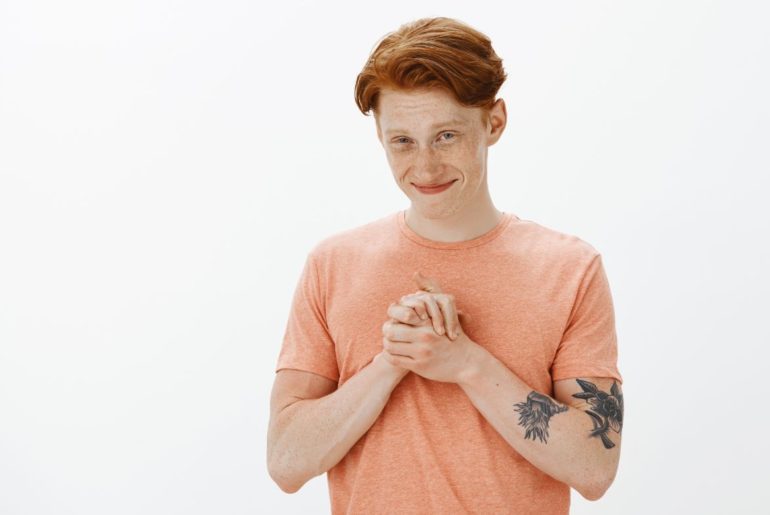If you have recently observed someone with their hands clenched together then you may be wondering why and what it means.
This post will try to help you figure out why someone might have their hands clenched together and to help you to make sense of it as it happens in the future.
So, what does it mean when someone clenches their hands together? Possible causes of someone clenching their hands together are that they’re feeling nervous or anxious, aggressive, confident, cold, bored or in disagreement with what’s being said.
The way in which someone clenches their hands together will actually have a large impact on what it might mean. To figure out the meaning it will also be very helpful to look at other body language signals that they are showing.
Why someone might clench their hands together
There are a number of reasons that someone might clench their hands together and each of them will likely come with some specific body language signals.
Below, I will mention a number of reasons that someone might clench their hands together and the body language signals that you can expect to see with it.
Confidence
One reason that someone might have their hands clenched together could be that they are feeling confident.
If this is the case, it would be more likely that they are standing with their hands held behind their back. This is because it exposes their bodies and indicates that they are not feeling threatened.
They might also have their fingers interlaced with their thumbs pointing up or they might have their hands in a steeple position where the fingers touch each other.
If they are feeling confident then it is likely that there would be a number of body language signals along with it.
- They would likely be standing with their feet wide apart
- They wouldn’t likely be slouching much
- They would be standing upright with a slightly extended neck
- They might be leaning back a bit to make the chest appear bigger,
- Their voice might sound deeper
- They wouldn’t be doing many rubbing behaviors.
Anxiety
If they have their hands clenched together in front of them at a height below the waist then it would suggest that they are feeling anxious.
Having the hands clenched out in front protects the vulnerable parts of the body since it forms an arm barrier. This can help them to feel more secure.
Additionally, If they rub their hands together, if they have their thumbs clenched beneath their fingers or if they are clenched in front of the abdominal area then it would be more likely that it is due to anxiety.
If they are feeling anxious then there would likely be a number of clues that you could notice from their body language.
- They might tuck their feet around the legs of their chair
- They might start to rub their legs face, arms or neck
- They might cover their mouth often
- They might touch their neck often
- They might point their feet towards the exit
- They might glance towards the exit a lot
- You may notice that they begin to sweat
- Their pupils might appear a lot more constricted than usual
- You might notice that they tap with their feet a lot
- They could be quivering below the eyes or mouth
- Their voice might sound a lot more high pitched than usual and they might go high pitch towards the ends of their sentences
Coldness
It may seem obvious but it could just be that they have cold hands and they’re trying to warm them up a bit.
If it’s cold outside then you should avoid making assumptions about their emotional state solely based on if they have their hands clenched together. This is why it is important to consider body language clusters instead of making conclusions from single pieces of body language.
Boredom
If they have their hands clenched and they’re resting on them then it could suggest that they are bored.
If this is the case then it would be more likely that they will be showing other signs of boredom.
- Their feet might face the exit
- Their pupils may appear constricted
- They might glance towards the exit or a clock frequently
- Their lips may appear tight
- They may be tapping their feet repeatedly
- They might appear to be slouched over
If you’re giving a speech or you’re talking to someone and they show the above signs then if you want to keep them interested you should try to get them out of that position. You could do it by getting them to move or even by handing them something.
Aggression
If they’re clenching their hands very tightly then it could indicate that they are feeling very aggressive and they’re restraining themselves or they’re feeling very anxious.
If they’re feeling aggressive they would likely be showing a number of other signs of aggression
- Clenched teeth and jaw
- Tight lips that appear hidden or they might be showing their teeth
- Their face might appear very red
- They might be tensing their muscles
- Their eyes would appear constricted and they would be squinting
- You would likely see furrowing of they eyebrows where they pinch inwards
They don’t like what is being said
The reason that they might have clenched their hands together is that they disagree with what they just heard.
One way that they might clench their hands together in this situation would be if they interlace the fingers with the thumb down suddenly. Alternatively, they might clench them with the fingers in front of the mouth.
If it is the case that they did it because they disagree with what was said then they would likely have gone into that position right after someone said something disagreeable.
They would also likely have shown slight signs of anxiety when they heard it. So, they might have rubbed their face, neck, ears, arms or legs or they may have tightened their lips momentarily.
Look at other body language signals that they are showing
When trying to figure out what a person might be feeling like it’s important to consider groups of body language signals at a time instead of drawing conclusions from single signals.
You should look to see if they are presenting their palms. If they are then it would suggest that they are feeling comfortable. In this case, the clenched hands would suggest that they are cold or confident.
Observe for clenching of the jaw and tightening their lips or other muscles. If they are then it would suggest that they are feeling aggressive.
Observe for quivering around the eyes or mouth since it would be an indicator of stress/ anxiety.
If they are feeling comfortable then their smiles will be
When we’re feeling happy it can actually cause our pupils to dilate and if we’re feeling sad it can cause them to constrict so you should observe the appearance of their pupils. Also, look at where they are glancing and observe for
People don’t usually think about what their feet are suggesting so the feet can actually be a good indicator of how people are feeling. This means that you should observe the feet to see where they are facing and if and when they start tapping.
Consider the environment
When trying to figure out why someone might have their hands clenched it would help to consider the environment that they’re in.
If it’s in a job interview then it would suggest nervousness. If it’s while they’re in a social environment then they might be anxious or they might be feeling confident depending on how they are clenching their hands.
Think about when they did it
It would also be helpful to think about what happened when they clenched their hands together.
It is to be expected that they will be nervous at the start of an interview so the clenched hands would simply suggest that they have some normal interview nerves that should go away as the interview progresses.
If they do it later on, in the interview, it would suggest that a question has made them anxious especially if they do it right after you ask them something.
Learn their normal behavior
Knowing what their normal body language looks like would also be helpful in figuring out why they clenched their hands together.
If it’s a normal thing that they do then it wouldn’t be a strong indicator that something is wrong. However, if they rarely do it then it would be necessary to consider what might be causing it.
Related
What does it mean if the hands are clasped in front? If someone clasps their hands in front of them then it would often suggest that they are feeling anxious especially if they combine it with rubbing behaviors.
If you want to learn more about body language, a book I would recommend would be The Definitive Book of Body Language (on Amazon). It shows you how to interpret body language and understand people's true intentions.


